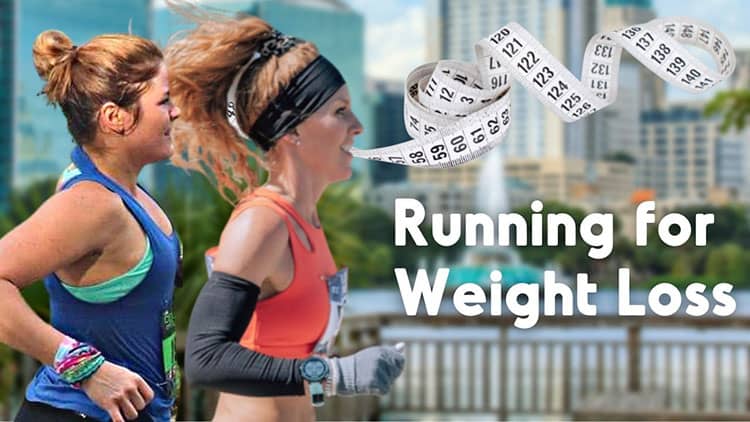Is running an effective way to help you lose weight? What is the biggest mistake you can do when start running for weight loss? And what should you eat around your training? I had the opportunity to speak about this and much more with Erica Weitz, a running coach, and personal trainer.
What type of running is best for weight loss?
The best thing to do for beginners is to start slowly and not make the mistake to think that the more you run, the more you are going to lose weight. Indeed, although this can be true, you don’t want to sacrifice your health in the process of losing weight.
Erica recommends a very basic beginner’s training program since it can be very helpful to have a coach guiding you along the way, Alternatively, if you want to do it on your own, start off slow and incorporate one interval workout a week.
Those interval workouts, that consist of alternating high-intensity fast bursts of speed with a walk or an easy jog, are particularly effective for weight loss. Indeed, they really burn the most calories in a short amount of time and help enhance metabolism too.
What diet do you suggest when running for weight loss?
Let’s start by saying that nutrition is a huge part of running and it also affects how you’re going to feel in your everyday life. Indeed, there’s a direct relationship between nutrition, performance, and weight loss (click here for my 5 Weight Loss Motivation tips). Here are some tips to optimize your diet and run your way to weight loss.
First, make sure to consume something before your workouts or runs so that your body has sufficient energy to exercise. It doesn’t have to be a big meal: even a small snack, like a rice cake or some oats, could do. Test with different foods and understand what works best with your body. In addition, make sure to give yourself enough time to digest.
Second, refueling is equally important, as you exert a lot of energy during the workout, and you want to properly recover and be able to exercise again in the following days. A good blend of protein and carbs is ideal to replenish what you have lost: this could be for example a protein shake with different fruits in it and a splash of unsweetened almond milk.
If you are an athlete, you should try to incorporate about 15 grams of protein and 45 grams of carbs before and after workouts. In general, opt for complex carbohydrates and whole grains. However, if eaten soon before your workout, a little portion of refined carbs can help you run faster and longer, as those are released quicker into the system.
Overall, consistency is key. If you maintain a healthy diet for the most part, you’re going to see results. The biggest mistake one can do is to be really strict one day, and then binge on the next. Eating around your workouts helps you mitigate any cravings late at night and avoid binging. That’s why it is important to eat even though you’re trying to lose weight, and even if you’re not hungry.
What is the right macro split when running for weight loss?
When it comes to running for weight loss, for beginners, it’s good to start with a 40% protein, 20% fat 40% carbohydrate split, which can then be adjusted based on how you feel. This is why you need to learn how to be in tune with yourself and know how you feel. If you’re bonking quickly on your runs, you might increase the carbohydrates up to 50%. However, never go under 15% with the fats, as those (namely “healthy” fats) are integral to your overall health, brain health, energy, nutrient absorption, and much more.
It is important to go by how you feel, not how you look. If you’re running for good performance, doing proper strength training, and eating what works well for you, you are going automatically to end up looking the way you’re supposed to look and perform the way you’re supposed to perform. The ultimate goal should always be to be healthy and feel good. The weight loss will come along with it.
How can one lose weight in a sustainable way?
Most people focus too much on losing weight but not on what’s most important, which is their health, happiness, and longevity. Those are the goals that are going to push you further.
A lot of times weight loss is powered by willpower (click here for my 5 Weight Loss Motivation tips). However, this is finite, so you need to find something more sustainable in the long run. There are a lot of fad diets that can make you lose weight very quickly, but keeping it off is a whole other thing.
Everyone’s body is different and metabolizes food differently. Some people might lose weight pretty fast, while other people take a really really long time to do it. The most important thing is to stick to a couple of basic rules for sustainable weight loss.
Eat whole foods and don’t be too strict with yourself
The number one is to eat a prevalence of whole foods. Number two is to identify your “bad” habits and find ways to replace them with healthier ones. Habits like sleeping an adequate amount of hours and reducing your stress are incredibly important for weight loss, so you definitely want to take those into account.
Third, don’t be too strict. Indulging in some “less wholesome” foods is not only human but can even help you sustain your healthy eating and exercise regimen for longer. A balance of 90% whole foods and 10% “treats” is ideal.
How to adjust your food to your training schedule when running for weight loss
The fourth is to start looking at your training schedule and adjust your eating plan to it. Let’s suppose you’re training for performance: you have two days a week where you have hard efforts and one day with a long run. Those are the days when you need to eat the most and get the fuel that gets you through the rest of the week. On the contrary, on your off days, you might slightly scale down your food intake and focus more on your protein and vegetable intake, while consuming a lighter amount of carbohydrates.
Don’t become too obsessive
Finally, it is very important not to be obsessive. A lot of runners are very obsessed with their eating, and many people in the running world have eating disorders. Having poor nutrition when you’re training at such a high level is really detrimental, as you’re not getting the right fuel and you may cause permanent damage to your bones, muscles, and, in general, to your overall health condition.
In conclusion, longevity is the most important thing when running. If something is going to sacrifice your health, then it’s not worth it. Being strong and healthy is much more beneficial for runners than being malnourished and skinny.
How to improve your eating habits

Firstly, focus on switching out a lot of your processed foods for whole and nutritious foods. For this purpose, you can try to fill at least half of your plate with colorful fruits and veggies. For guidance, check out “My Healthy Meal Formula“.
Second, if you’re vegan, you can combine different sources of plant protein and make sure you get them with every meal.
Third, focus on improving those lifestyle habits that are going to help you along the way, such as your sleep hygiene, or your stress management techniques.
Last but not least, be self-compassionate, don’t kill yourself over trying to follow some stupid diet, and don’t give yourself a hard time because you’ve indulged a little bit, or skipped a workout.
Train with Erica!

Erica has several different programs, suitable for different training levels, and preferences. Whether you like to train at home or in the gym, she offers individually customized coaching programs and running plans. Running for weight loss programs are available as well.
Erica also has also two core challenges on her website and Facebook group. Both are made of four workouts a week, each of them is about 10 to 15 minutes long. They focus on your entire core from the obliques, to the upper and lower abs.
Check everything out on exclusive-endurance.com.
Please let us know in the comments if you have any questions or concerns and we will make sure to answer them all!




